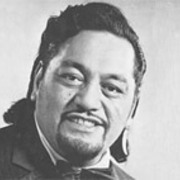
Prince Tui Teka
He was nicknamed The Prince, but Tūhoe legend Tui Teka lived his life as the king of Māori entertainment. He was the ultimate showband performer, able to play a multitude of instruments, act, and sing anything from country and western and rock'n'roll to love ballads and waiata, interspersed with side-splitting comedy.
Tui Teka, or Tui Latui as he sometimes billed himself, was born on 8 March 1937 in Ruatāhuna, a small Urewera settlement on the unsealed road between Wai-O-Tapu and Wairoa. His mother played mouth organ and clarinet; his father was a saxophonist with a bush band deep in the heart of Tūhoe country.
He was said to be playing guitar and saxophone by age three. Teka refined his talents at local woolshed dances as a teen before joining a circus in the early 1950s, which took him across the Tasman.
In Australia Teka quickly graduated from sweeping up after the elephants to singing and performing. He learned showmanship traveling round the continent. In 1959 he joined The Royal Samoans and Māoris, which was soon renamed The Māori Troubadours.
The band recorded the classic rock'n'roll single 'Shakin’ in the Shaky Isles', an EP of Māori songs, and the album A Little This … A Little That, all in 1960. He kept his new act on the road, traveling with a convoy of cars, trucks and caravans around the fairs and showgrounds. A typical ad promised "enchanting music, exotic island dances, wonderful singing and a fast moving comedy show", and he kept his tent full day after day.
His stage wardrobe was often as memorable as his songs, and what he lacked in vocal skills he made up for with onstage charisma. He would stand up in front of crowds, flashing a toothy grin, swaying and shimmying his oversized body in rhinestone jackets and custom-made embroidered shirts as he threw tongue-in-cheek quips to the audience.
In 1966 Teka decided he’d had enough of showgrounds, and joined the Māori Volcanics just in time for a tour to Japan. That led to further work through Asia, the Middle East, Europe, the United Kingdom, the United States, the Caribbean, and of course the Pacific.
When the Volcanics broke up for the first time after a farewell tour of New Zealand, Teka went solo, returning to the clubs of Australia and Southeast Asia. He also struck up a relationship with Terence O’Neill-Joyce’s Ode Records label, putting out a series of singles and albums, starting in 1972 as the Tui Teka Five with 'Something to Believe In', as well as 'For the Life of Me', 1973’s 'Il Silenzio' (a remake of Italian trumpeter Nini Rosso’s 1965 hit) 'E Hine Hoki Mai' and 'Smoke Gets in Your Eyes'.
In 1976 he released the live Prince Tui Teka in Fiji album, capturing his stage show, and an album of Māori songs. After a six year recording break Teka signed with major label RCA, and returned to the charts with te reo chart-topper 'E Ipo'. Ngoi Pēwhairangi wrote the song for him to woo beloved wife and singing partner Missy, who he married in 1976.
He had moved back permanently to New Zealand in 1981, settling in Tokomaru Bay. He also began doing film and television work. Alongside TV specials like this 1983 variety show, he played the king of a mythical Pacific Island in $13 million movie Savage Islands (1983, aka Nate and Hayes). The Tommy Lee Jones swashbuckler was initiated by New Zealander Rob Whitehouse and sometime Kiwi Lloyd Phillips.
Teka also had a small role as the postmaster in another tale set on a mythical Pacific Island: boy-and-a-turtle tale The Silent One (1984), based on a Joy Cowley story. Earlier, he'd appeared in an episode of Jack Holborn (1982). The German miniseries about an 18th century orphan featured some Kiwi locations and actors.
Teka cameoed in and sang on two tracks for classic Ronald Hugh Morrieson comedy Came A Hot Friday: 'Work for the Money' and 'Out in the Cold'. After the movie debuted, composer Stephen McCurdy revisited the songs for release as a single, but Teka passed away before the recordings could be completed. On 'Work for the Money' there was only a single take of one chorus and a verse to work with, requiring some ingenious editing. The second track 'Out in the Cold' was later collected on Tui Teka compilation The Greatest.
Teka's songs are also heard in Once Were Warriors sequel What Becomes of the Broken Hearted? and Boy.
Prince Tui Teka died of a heart attack on 23 January 1985, during a break while performing at Northland's Ruawai Tavern. He was survived by daughters Davinia and Missy Junior — and his wife Missy, who died in a motor accident on 29 February 2008.
Profile updated on 3 March 2023
Sources include
Stephen McCurdy
John Dix, 'Prince Tui Teka' AudioCulture website. Loaded 12 January 2014. Accessed 2 March 2023
Mahora Peters, Showband! Mahora and the Māori Volcanics (2005: Wellington, Huia Publishers)
Unknown writer, '"Jack Holborn (1982)"' Cinema Astoria website, via Internet Archive Wayback Machine. Accessed 3 March 2023